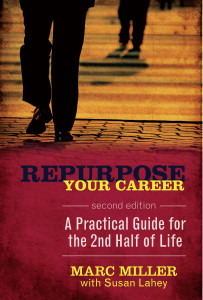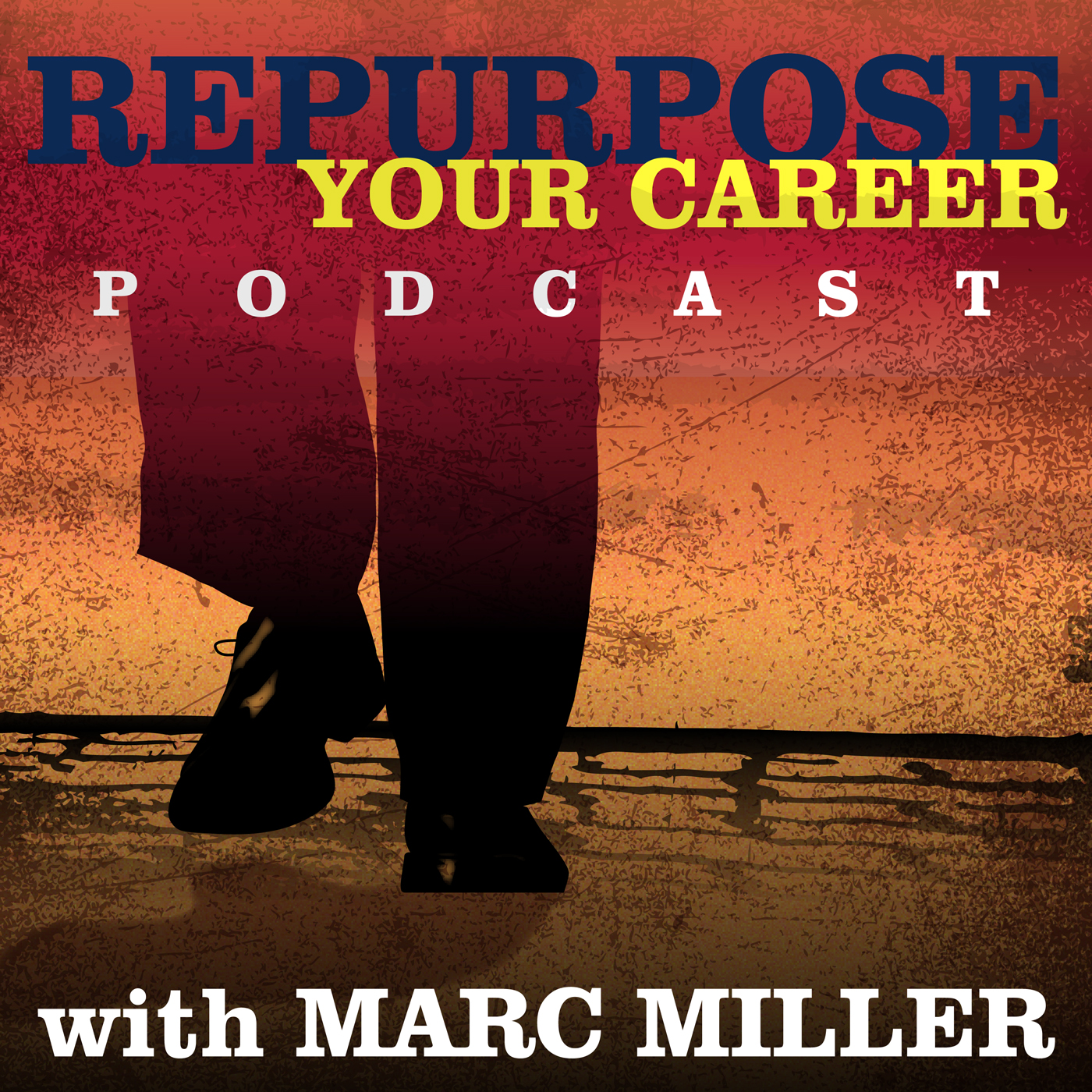Episode 41 – Marc Miller reads a chapter, “What is Your Personal Operating System?” of his new audio book, to be released in September, 2017.
Description:
 In this episode, Marc reads a chapter of his new audio book. The topic is knowing yourself. Marc explains the difficulties people cause themselves when they take jobs that are not suited for their personalities and gives tips for how to cope with situations that are not optimal. Marc offers case studies, and what adjustments were made. Marc also describes several career and personality profile assessments that are available to help you personalize your career search so that your personality traits can flourish at work. Listen in to learn how to make sure the career you target is really a career that fits your personal operating system.
In this episode, Marc reads a chapter of his new audio book. The topic is knowing yourself. Marc explains the difficulties people cause themselves when they take jobs that are not suited for their personalities and gives tips for how to cope with situations that are not optimal. Marc offers case studies, and what adjustments were made. Marc also describes several career and personality profile assessments that are available to help you personalize your career search so that your personality traits can flourish at work. Listen in to learn how to make sure the career you target is really a career that fits your personal operating system.
Key Takeaways:
[2:29] Most of Marc’s clients have their sets of needs, stressors, and behaviors running in the background, like an operating system. This impacts everything about how they feel and function. One might be a deliberate researcher, frustrated by the amount of work his boss gives him.
[3:26] The boss doesn’t expect them to research it, just to do it. they need a job where thoroughness would be an asset. Assessments help prevent mismatched expectations. [3:51] The first step to career bliss is to know yourself. Many go after jobs, looking for new circumstances, not knowing where the real problems lay with their previous jobs. Assessments reveal what you need, what stresses you, and what makes you happy.


Marc Miller
What is Your Personal Operating System? A Chapter from the audiobook Repurpose Your Career #041
Download Link | iTunes | Stitcher Radio | Google Podcast | Podbean | TuneIn | Overcast
[4:29] Assessments reveal truths about us that we might not realize affect our career. Marc lists several assessments. Marc found the Birkman most valuable for his own assessment. It told him he needed plenty of alone time, balanced with social activity.
[6:00] The Birkman Assessment is 298 questions about what you do, think, and believe, and what you think most people do, think, and believe. After all the questions, you sit down with a Birkman advisor, who tells things you sort of knew, deep down.
[7:06] Marc’s client scored high on his math SAT and studied engineering. He was a very emotional, empathetic person. Over the years he learned to act like his colleagues, but he was miserable. The Birkman confirmed that empathy was a strength he hid.
[7:53] Marc cites a Fortune Magazine article about the Birkman method. A lot of us behave in ways that are not natural for us, for the sakes of our jobs. That behavior can make us miserable, or we can learn coping skills. We play roles because we get paid to play those roles. Marc schmoozes, but he gets his energy from his time alone.
[9:51] Our society is biased towards extroverts. They make more money. They are more accepted as leaders. They are perceived as more competent. Susan Cain says many great thinkers and artists are introverts and cites a Harvard Business School team exercise where an introvert with the right answer did not speak, and no one asked him.
[10:56] If you’re an introvert, find a way to cope so you don’t miss out. Cain, an introvert, pretends to be an extrovert but found she needed little restorative niches during the day, to do something she enjoys. Marc has a client who takes breaks between meetings to knit. Another brings a book. Another brings a camera.
[11:46] A top-level sales rep, married to another top-level sales rep both act like extroverts, but the wife is an introvert. After a conference, she gets room service, while the husband goes out to a group dinner. There are a lot of introverts in extroverts’ clothing. After a social situation, an introvert needs a break, to recharge.
[12:38] A giant factor in being happy in a career is figuring out what makes your personal operating system work best. Marc talks about women who are ‘stealth competitors,’ who seem affable, but who are angry that they are not rewarded with recognition and raises for hard work. They ask for very little, and that’s what they get.
[14:17] Highly organized people succeed in their fields by prioritizing tasks and focusing their attention and energy where it’s most effective. They are not intimidated by a large workload, as long as they get to decide how to do it. A micromanaging boss will not help them. Some people are uncomfortable with autonomy and need more direction.
[15:19] Some people function beautifully with a lot of distractions and switch easily from one task to the next. Others need stretches of uninterrupted work time to accomplish their best results. Being interrupted all the time shatters their thoughts and leaves them frustrated.
[16:00] Spend time considering how you work best. It can make all the difference in the world, in terms of job satisfaction and performance. Marc took a trip to Australia to teach a four-day sales class. At the end of the day, some of the class wanted to take him out for drinks. Marc chose a quiet dinner with a few close friends and watched TV, instead.
[16:35] The Birkman taught one of Marc’s clients she was happier with a desk near a window, and plants. Another found she was upset when others with less expertise commented on her part of a project. She learned to handle it gracefully.
[17:08] It took Marc months to internalize what he learned in his Birkman report, with the help of his advisor. He still goes back to review the report and is still learning about himself. He also learned he has an unusual competence for reading a Birkman report. Marc talks about traits that he has learned go together in various personalities.
[18:12] Marc has gotten other tools from client Birkman reports, to help them understand their needs, from process thinkers who thought they were creative, to creatives who thought they were process thinkers. Understanding yourself leads to better decisions and outcomes. What could an assessment tell you, to set you right?
[20:10] Action Steps: Take a career assessment test, such as the Birkman, to uncover rules and motivators you didn’t even know you had. Contact Marc to schedule an assessment.
[20:40] The Birkman is a very complicated assessment, which is why it is not often discussed in the career space. It is used more often in the C-suite. Marc explains how he uses it with his clients. Marc will give you a 20% discount on the Birkman assessment if you mention you heard about it on this podcast episode.
Mentioned in This Episode:
Contact Marc, and ask questions at: Careerpivot.com/contact-me. Marc is accepting new clients, so reach out to him. He will supply a link to his calendar to set up a call.
Please pick up a copy of Repurpose Your Career: A Practical Guide for the 2nd Half of Life, by Marc Miller and Susan Lahey. When you get done reading the book, please leave a review on Amazon.
CareerPivot.com/ryc-resources (Repurpose Your Career Resources)
Please take a moment — go to iTunes, Stitcher, or Google Play. Give this podcast a review and subscribe! If you’re not sure how to leave a review, please go to CareerPivot.com/review, and read the detailed instructions there.
Disc Profile
Birkman Method Personality Assessment Call Marc for a 20% discount on this assessment.
Quiet: The Power of Introverts in a World That Can’t Stop Talking, by Susan Cain
How to Find More About the Podcast and Subscribe
Make sure to check out the Career Pivot Community.
You can contact us here.
Marc invites you to connect with him on LinkedIn.com/in/mrmiller. Just include in the connection request that you listen to this podcast.
You can look for Career Pivot on Facebook, LinkedIn, or @CareerPivot on Twitter.
You can get updates on this podcast by clicking on the Get Career Pivot Insights button below.
You can also subscribe to the podcast on iTunes, Stitcher, Google Podcasts, Podbean, Overcast, Spotify, and Pandora.
The podcast is available on YouTube.
Please consider writing a review on Apple Podcast or on Podchaser.com.
Like What Your Read? Get Career Pivot Insights
Do You Need Help With ...
Check out our Help Center where you have access to 14 different content portals.

